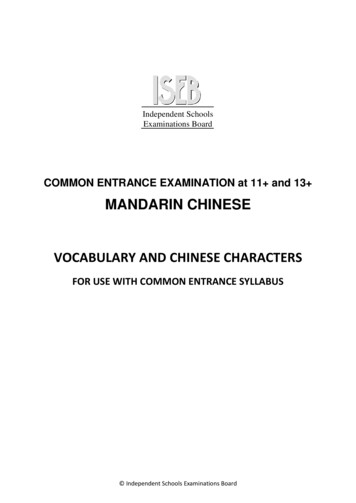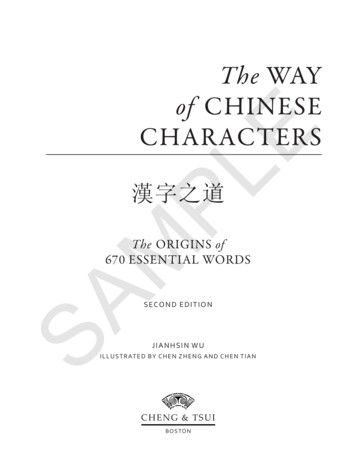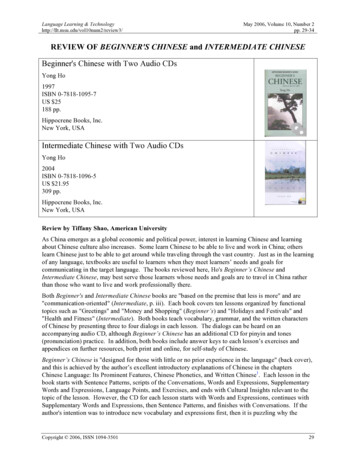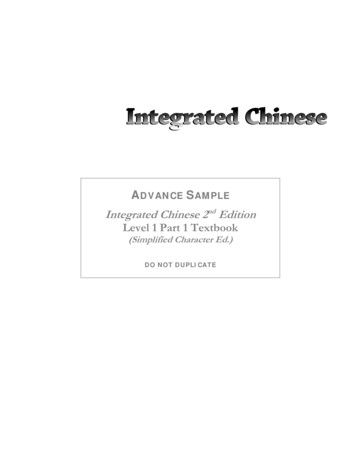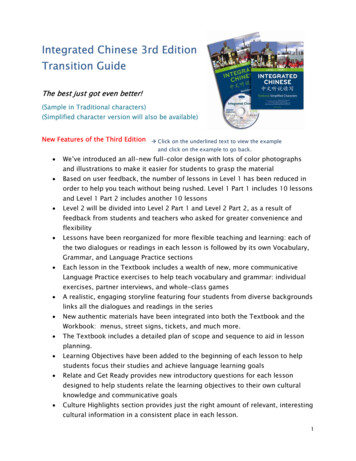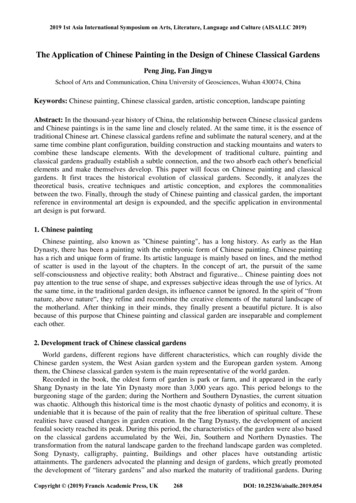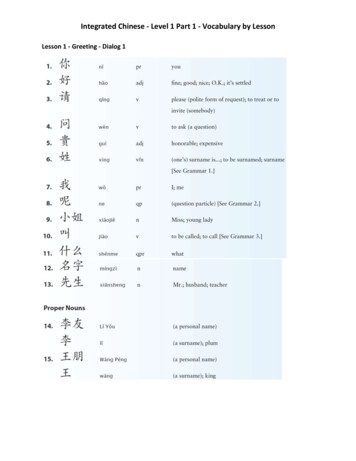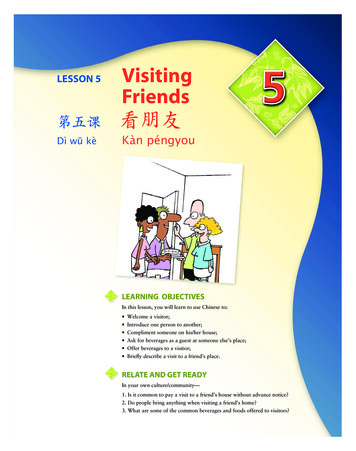
Transcription
第五课VisitingFriends看朋友Dì wǔ kèKàn péngyouLESSON 5LEARNING OBJECTIVESIn this lesson, you will learn to use Chinese to: Welcome a visitor;Introduce one person to another;Compliment someone on his/her house;Ask for beverages as a guest at someone else’s place;Offer beverages to a visitor;Briefly describe a visit to a friend’s place.RELATE AND GET READYIn your own culture/community—1. Is it common to pay a visit to a friend’s house without advance notice?2. Do people bring anything when visiting a friend’s home?3. What are some of the common beverages and foods offered to visitors?Simp-1-1-IC3-121Lesson 5.indd 1213/29/2010 1:53:10 PM
122Integrated Chinese Level 1 Part 1 TextbookDialogue: Visiting a Friend’s Home(The doorbell 121Lesson 5.indd 1223/29/2010 1:53:15 PM
123Lesson 5 Visiting Friends是吗? 请坐,请坐。小音,你在 哪儿 家没有可乐。LANGUAGE NOTESAlthough it takes a question mark,是吗 (Shì ma?) is not a questionhere but a mild expression of surprise onhearing something unexpected. Here itindicates one’s modesty on receiving acompliment. It could be translated as“Is that so?” “You don't say!” or “Really?”哪儿 (nǎr) is a question word meaning“where.” Do not confuse it with 那儿(nàr, there). 这儿 (zhèr) means “here”in Chinese.那给我一杯水吧。(The doorbell rings.)Shéi ya?Shì wǒ, Wáng Péng, hái yǒu Lǐ Yǒu.Qǐng jìn, qǐng jìn, kuài jìn lai! Lái, wǒ jièshào yí xià1, zhè shì wǒ jiějie, Gāo Xiǎoyīn.Xiǎoyīn, nǐ hǎo. Rènshi nǐ hěn gāoxìng.Rènshi nǐmen wǒ yě hěn gāoxìng.Nǐmen jiā hěn dà2, yě hěn piàoliang.Shì ma?Qǐng zuò, qǐng zuò.Xiǎoyīn, nǐ zài3 nǎrgōngzuò?Wǒ zài xuéxiào gōngzuò. Nǐmen xiǎng hē diǎnr1shénme? Hē chá, háishi hē kāfēi?Wǒ hē chá ba.4Wǒ yào yì píng kělè, kěyǐ ma?Duìbuqǐ, wǒmen jiā méi yǒu kělè.Nà gěi wǒ yì bēi shuǐ ba.Simp-1-1-IC3-121Lesson 5.indd 1233/29/2010 1:53:22 PM
124Integrated Chinese Level 1 Part 1 ��要瓶Simp-1-1-IC3-121Lesson 5.indd 124yap(interjectory particle used to soften a question)jìnvto enterkuàiadv/adjfast, quick; quicklyjìn laivcto come inláivto comejièshàovto introduceyí xiàn monce; a bit [See Grammar 1.]gāoxìngadjhappy, pleasedpiàoliangadjprettyzuòvto sitzàiprepat; in; on [See Grammar 3.]nǎrqprwherexuéxiàonschoolhēvto drinkdiǎn(r)ma little, a bit; some [See Grammar 1.]chánteakāfēincoffeebap(a sentence-final particle) [See Grammar 4.]yàovto wantpíngm/n(measure word for bottles); bottle3/29/2010 1:53:27 PM
Lesson 5 Visiting 不起给杯kělèn[Coke or Pepsi] colakěyǐmvcan; mayduìbuqǐvsorrygěivto givebēim(measure word forcup and glass)26.水shuǐnwaterProper Noun27.高小音Name the beverages in the picture inChinese.Gāo Xiǎoyīn(a personal name)你要一杯水还是一瓶水?Nǐ yào yì bēi shuǐ háishi yì píng shuǐ?Simp-1-1-IC3-121Lesson 5.indd 1253/29/2010 1:53:35 PM
126Integrated Chinese Level 1 Part 1 TextbookGrammar1.一下 (yí xià) and (一)点儿 ({yì} diǎnr) Moderating the Tone ofVoiceFollowing a verb, both一下 (yí xià, lit. “once”) and (一)点儿 ({yì} diǎnr “a bit”) cansoften the tone in a question or an imperative sentence, therefore making it more polite. When usedin this way,一下 (yí xià) modifies the verb, while (一)点儿 ({yì} diǎnr) modifies the object.你看一下,这是谁的照片?Nǐ kàn yí xià, zhè shì shéi de zhàopiàn?(Take a look. Whose photo is this?)你想吃点儿什么?Nǐ xiǎng chī diǎnr shénme?(What would you like to eat?)你进来一下。Nǐ jìn lai yí xià.(Come in for a minute.)你喝一点儿茶吧。Nǐ hē yìdiǎnr chá ba.(Have a little tea.)2. Adjectives as PredicatesIn Chinese, when an adjective functions as a predicate, it is not preceded by the verb是 (shì,很 (hěn, very), as seen in (1), (2), (3), and (4), or some otheradverbial modifier. However, 很 (hěn) is not as strong as “very” in English. When forming aquestion with an adjective as the predicate, 很 is not used, as seen in (5) and (6).to be). It is usually modified bySimp-1-1-IC3-121Lesson 5.indd 1263/29/2010 1:53:41 PM
Lesson 5 Visiting Friends127我今天很高兴。Wǒ jīntiān hěn gāoxìng.(I’m happy today.)他妹妹很漂亮。Tā mèimei hěn piàoliang.(His younger sister is pretty.)那个电影很好。Nà ge diànyǐng hěn hǎo.(That movie is good.)你们大学很大。Nǐmen dàxué hěn dà.(Your university is very large.)A:你弟弟高吗?Nǐ dìdi gāo ma?(Is your younger brother tall?)B:他很高。Tā hěn gāo.(He is tall.)A:你家大吗?Nǐ jiā dà ma?(Is your house big?)B:我家不大,很小。Wǒ jiā bú dà, hěn xiǎo.(My house is not big, it’s small.)Chinese adjectives without很 (hěn) or any sort of modifier before them can often implycomparison or contrast, as seen in (7) and (8) below.Simp-1-1-IC3-121Lesson 5.indd 1273/29/2010 1:53:44 PM
128Integrated Chinese Level 1 Part 1 TextbookA:姐姐漂亮还是妹妹漂亮?Jiějie piàoliang háishi mèimei piàoliang?(Who’s prettier, the older sister or the younger sister?)B:妹妹漂亮。Mèimei piàoliang.(The younger sister is ��Mèimei de Zhōngwén hǎo, wǒ de Zhōngwén bù hǎo.(My younger sister’s Chinese is good. My Chinese is not good.)3. The Preposition 在 (zài, at; in; on)Combined with a noun, the preposition在 (zài) indicates location. When the phrase is placedbefore a verb, it indicates the location of the action.A:A:我的书在哪儿?B:在那儿。Wǒ de shū zài nǎr?Zài nàr.(Where is my book?It’s over �Nǐ zài nǎr gōngzuò?Wǒ zài zhèr gōngzuò.(Where do you work?I work here.)我在这个大学学中文。Wǒ zài zhè ge dàxué xué Zhōngwén.(I study Chinese at this university.)我不喜欢在家看电影。Wǒ bù xǐhuan zài jiā kàn diànyǐng.(I don’t like to watch movies at home.)Simp-1-1-IC3-121Lesson 5.indd 1283/29/2010 1:53:46 PM
Lesson 5 Visiting Friends1294. The Particle 吧 (ba)吧 (ba) is a sentence-final “suggestion” particle, often used at the end of an imperative sentence tosoften the tone.你喝咖啡吧。Nǐ hē kāfēi ba.(Why don’t you have some coffee?)请进来吧。Qǐng jìn lai ba.(Come in, please.)我们跳舞吧。Wǒmen tiào wǔ ba.(Let’s dance.)Language PracticeA.1.一下 (yí xià)You wish to look at your brother’s girlfriend’s picture, so you say to yourbrother 哥哥,我你女朋友的照片,好吗?2.nǐ nǚpéngyoude zhàopiàn, hǎo ma?You’d like your friend, Little Bai, to introduce you to Ms. Li, so you say -IC3-121Lesson 5.indd 129Gēge, wǒXiǎo Bái, wǒ xiǎng rènshi Lǐ xiǎojiě.Qǐng nǐ.3/29/2010 1:53:48 PM
130Integrated Chinese Level 1 Part 1 Textbook3.You are at the doctor’s office for your appointment; the nurse tells you the doctoris busy, and asks you to sit down for a bit. So she says u shìr, qǐng nǐ.Your roommate has bought a CD, and suggests that you listen to it, so shesays 这个音乐不错。你。5.Duìbuqǐ, yīshēng xiànzàiZhège yīnyuè búcuò.Nǐ.Your teacher wants to talk to you about something after class and asks you tocome with him, so he says 我有事儿找你。你。Wǒ yǒu shìr zhǎo nǐ.Nǐ.B. Adjectives as Predicates高文中的家 漂亮EXAMPLE:Gāo Wénzhōng de jiā piàoliangIf people ask your opinion of Gao Wenzhong’s house,高文中的家漂亮吗?Gāo Wénzhōng de jiā piàoliang ma?and you think Gao Wenzhong’s house is beautifully decorated, you can say 高文中的家很漂亮。Gāo Wénzhōng de jiā hěn piàoliang.But, if you don’t think Gao’s house is beautifully decorated, you can say 高文中的家不漂亮。Gāo Wénzhōng de jiā bú piàoliang.Work with a partner. Find out from each other what you think about your doctor, school, teacher,classmates, and textbook.你的医生 忙2. 你的学校 大1.Simp-1-1-IC3-121Lesson 5.indd 1301. Nǐ de yīshēng máng2. Nǐ de xuéxiào dà3/29/2010 1:53:50 PM
Lesson 5 Visiting Friends你的同学 高兴4. 你的老师 好5. 你的书 有意思3.C.1.1313. Nǐ de tóngxué gāoxìng4. Nǐ de lǎoshī hǎo5. Nǐ de shū yǒu yìsi在 (zài)Look at the pictures given, and tell where Wang Peng and Li You are, and whatthey are doing (túshūguǎn, library)Wáng Péng hé Lǐ Yǒu zài túshūguǎn kàn shū.1.2.2.3.Everyone has a different routine and favorite places. Now let’s find out wherethese people do their activities.EXAMPLE:Simp-1-1-IC3-121Lesson 5.indd 131小高在哪儿工作?Xiǎo Gāo zài nǎr gōngzuò?小高在学校工作。Xiǎo Gāo zài xuéxiào gōngzuò.1.李医生在哪儿听音乐? Lǐ yīshēng zài nǎr tīng yīnyuè?2.王朋在哪儿打球?Wáng Péng zài nǎr dǎ qiú?3.李友在哪儿看电影?Lǐ Yǒu zài nǎr kàn diànyǐng?4.小白在哪儿睡觉?Xiǎo Bái zài nǎr shuì jiào?3/29/2010 1:53:52 PM
132Integrated Chinese Level 1 Part 1 TextbookD.点儿 (diǎnr)Imagine the main characters of the text all come to your house as your guests:you now try to offer them something to drink, to eat, or to do. Use the pictures asclues and work with a ��Gāo Wénzhōng, nǐ xiǎng hē diǎnr shénme?1.2.3.E. Do you all know each other in your class?Mobilize the entire class and form a big circle. Taking turns, introduce the personon your right to the person on your left.我介绍一下,这是。2: 认识你很高兴。我介绍一下,这是3: 认识你很高兴。我介绍一下,这是1: Wǒ jièshào yí xià,1:Simp-1-1-IC3-121Lesson 5.indd 132zhè shì.2: Rènshi nǐ hěn gāoxìng.。Wǒ jièshào yí xià, zhè shì.3: Rènshi nǐ hěn gāoxìng.。Wǒ jièshào yí xià, zhè shì.3/29/2010 1:53:56 PM
Lesson 5 Visiting Friends133F. Group ActivityIn groups of three, one acts as a host and asks the two guests what they wouldlike to drink:你/你们想喝点儿什么?B: 我喝吧。C: 我喝吧。A:A: Nǐ/Nǐmen xiǎng hē diǎnr shénme?B: Wǒ hēba.C: Wǒ hēba.Apologize to one of your guests that you don’t have the beverage and offer analternative:A:对不起,没有。 A: Duìbuqǐ, méiyǒu,可以吗?, kěyǐ ma?.The guest accepts or asks for something else:B or C:那给我一杯/一瓶吧。B or C: Nà gěi wǒ yì bēi/yì píngba.G. Survey the classFirst pair up and ask your partner these questions. Then report your findings tothe ��?The most popular beverage in the class isSimp-1-1-IC3-121Lesson 5.indd 133Nǐ xǐhuan hē shénme?Nǐ xǐhuan hē kělè háishi kāfēi?Nǐ xǐhuan hē chá ma?Nǐ xǐhuan hē shuǐ háishi hē chá?.3/29/2010 1:53:59 PM
134Integrated Chinese Level 1 Part 1 Textbook你想喝什么?Nǐ xiǎng hē shénme?Simp-1-1-IC3-121Lesson 5.indd 1343/29/2010 1:54:03 PM
135Lesson 5 Visiting FriendsNarrative: At a Friend’s 玩儿。在高文中家,他们认识了5 �图书馆工作。她请王朋喝 AGE NOTEUnlike its English counterpart,喝 (hē)always functions as a transitive verb.In other words, unless it’s clear fromthe context, the beverage has to bespecified. Therefore,他常常喝(Tā chángcháng hē) is not a completesentence unless when the beverage isunderstood, e.g.:A:他常常喝咖啡吗?(Tā chángcháng hē kāfēi ma?)Does he often drink coffee?B:他常常喝。(Tā chángcháng hē.)He often does.Simp-1-1-IC3-121Lesson 5.indd 1353/29/2010 1:54:07 PM
136Integrated Chinese Level 1 Part 1 TextbookZuótiān wǎnshang, Wáng Péng hé Lǐ Yǒu qù Gāo Wénzhōng jiā wánr. Zài Gāo Wénzhōngjiā, tāmen rènshi le5 Gāo Wénzhōng de jiějie. Tā jiào Gāo Xiǎoyīn, zài xuéxiào detúshūguǎn gōngzuò. Tā qǐng Wáng Péng hēchá, Wáng Péng hē le liǎng bēi. Lǐ Yǒubù hē chá, zhǐ hē le yì bēi shuǐ. Tāmen yìqǐ liáo tiānr, kàn diànshì. Wáng Péng hé Lǐ Yǒuwǎnshang shí’èr diǎn cái5 huí jiā.她在哪儿看书?Tā zài nǎr kàn Lesson 5.indd 136wán(r)vto have fun; to playlep(a dynamic particle) [See Grammar 5.]túshūguǎnnlibraryyìqǐadvtogetherliáo tiān(r)voto chatliáovto chattiānnskycáiadvnot until, only then [See Grammar 6.]huí jiāvoto go homehuívto return3/29/2010 1:54:12 PM
137Lesson 5 Visiting FriendsGrammar5. The Particle 了(le) (I)The dynamic particle了 (le) signifies: 1) the occurrence or completion of an action or event, or2) the emergence of a situation. The action, event, or situation usually pertains to the past, but了 (le) is not a past tense marker, and the use of了 (le) should not be taken as an equivalent to the past tense in English. In this lesson, 了sometimes it can refer to the future. Therefore(le) indicates the occurrence or completion of an action or event. It is usually used after a verb.But sometimes it appears after a verb and the object of the verb in interrogative and �Jīntiān Māma hē le sān bēi shuǐ.(Mom had three glasses of water today.)(occurrence or completion of an action, in the ngqīyī Xiǎo Gāo qǐng wǒ hē le yì píng kělè.(On Monday Little Gao bought me a bottle of cola.)(occurrence or completion of an event, in the past)A:昨天晚上你去打球了吗?Zuótiān wǎnshang nǐ qù dǎ qiú le ma?(Yesterday evening did you go play ball?)(occurrence or completion of an event, in the past, an interrogative sentence)B:昨天晚上我去打球了。Zuótiān wǎnshang wǒ qù dǎo qiú le.(Yesterday evening I went to play ball.)(occurrence or completion of an event, in the n wǒ chī le wǎnfàn qù kàn diànyǐng.(Tomorrow I’ll go see a movie after I have eaten dinner.)(occurrence or completion of an action in the first part of the sentence, in the future)Simp-1-1-IC3-121Lesson 5.indd 1373/29/2010 1:54:22 PM
138Integrated Chinese Level 1 Part 1 Textbook了 (le) — such as今天 (jīntiān, today) in (1),星期一 (xīngqīyī, Monday) in (2), or 昨天晚上 (zuótiānThere is often a specific time phrase in a sentence with the dynamic particlewǎnshang, last night) in (3).When了 (le) is used between the verb and the object, the object is usually preceded by amodifier. The following—numeral measure word—is the most common type of modifier for theobject:三杯 (sān bēi, three cups / three glasses) in (1)一瓶 (yì píng, one bottle) in (2)If there are other phrases or sentences following the object of the first clause, then the objectdoes not need a modifier. See example (4) above. This V了 O V(O) structure can be used todepict a sequence of two actions, and it doesn’t matter whether the two actions take place in thepast or in the future.If the object following了 (le) is a proper noun, as “Harry Potter” in (5) below, it does notneed a modifier, either.我昨天看了《哈利 波特》,那个电影很好。Wǒ zuótiān kàn le «Hālì Bōtè». Nà ge diànyǐng hěn hǎo.(I saw Harry Potter yesterday. That movie was good.)To say that an action did not take place in the past, use没(有) (méi {yǒu}) instead of不 了 (bù.le) or 没有 了 (méiyǒu le).FOR EXAMPLE:昨天我没有听音乐。Zuótiān wǒ méiyǒu tīng yīnyuè.(I didn’t listen to music ān wǒ bù tīng yīnyuè le.(6b)*昨天我没有听音乐了。*Zuótiān wǒ méiyǒu tīng yīnyuè le.Simp-1-1-IC3-121Lesson 5.indd 1383/29/2010 1:54:24 PM
139Lesson 5 Visiting FriendsInterrogative forms:A:你吃饭了吗?or你吃饭了没有?Nǐ chī fàn le ma? or Nǐ chī fàn le méiyǒu?(Did you eat?)B:我没吃。Wǒ méi chī.(No, I didn’t.)A:你喝了几杯水?Nǐ hē le jǐ bēi shuǐ?(How many glasses of water did you drink?)B:我喝了一杯水。Wǒ hē le yì bēi shuǐ.(I drank one glass of water.)6. The AdverbThe adverb才 (cái, not until)A sign on a bubble teashop, a reminder topassersby to drop inand get their daily cupof bubble tea.才 (cái, not until) indicates that the occurrence of an action or situation is later thanthe speaker may have expected. That lateness is perceived by the speaker, and is not necessarilyobjective, as seen in (2) and (3).才 (cái) never takes the particle了(le), whether or not it pertainsto an action or situation in the 。Wǒ qǐng tā liù diǎn chī wǎnfàn, tā liù diǎn bàn cái lái.(I invited him out to dinner at six o’clock. He didn’t come till �Xiǎo Gāo chángcháng wǎnshang shí’èr diǎn cái huí jiā.(Little Gao often doesn’t go home until midnight.)她晚上很晚才睡觉。Tā wǎnshang hěn wǎn cái shuì jiào.(She goes to bed very late in the evening.)Simp-1-1-IC3-121Lesson 5.indd 1393/29/2010 1:54:27 PM
140Integrated Chinese Level 1 Part 1 TextbookLanguage PracticeH.了(le)Little Gao has so much energy! He can do so much in one day: dancing, singing,studying, eating, and working. Look at the following pictures, and recap what hedid yesterday.EXAMPLE:1.I.x4Xiǎo Gāo zuótiānhē le sì bēi .x2x4才 (cái)Imagine you are a very disciplined and time-conscious person. You do everythingaccording to a set schedule. Your roommate, on the other hand, is a slow mover.Now you are comparing your daily routine with your roommate’s, and you havefound s/he does everything later than you do.我七点喝咖啡,她八点才喝7:00 vs. 8:00 (咖啡)。EXAMPLE:1.4.9:00 vs. 9:308:00 vs. 8:302.5.2:15 vs. 2:453.Wǒ qī diǎn hēkāfēi, tā bā diǎncái hē (kāfēi).6:00 vs. 7:159:30 vs. 12:00J. Find out what your partner did last � zuótiān wǎnshang qù péngyoujiā wánr le ma?If the answer is negative, then �Simp-1-1-IC3-121Lesson 5.indd 140Nǐ zuótiān wǎnshang qù nǎr le?Nǐ hē shénme le?3/29/2010 1:54:31 PM
Lesson 5 Visiting Friends你喝了几杯/几瓶?141Nǐ hē le jǐ bēi/jǐ píng?After gathering the information, report to the class what your partner did lastnight:昨天晚上去朋友家Mark zuótiān wǎnshang qù péngyou jiā玩了/没有去朋友家玩儿 wánr le/méiyǒu qù péngyou jiā wánr MarkK.It was Little Wang’s birthday yesterday.Recap what Little Wang did on his birthday according to the three picturesprovided. Don’t forget to mention the time in each picture!HOW ABOUT YOU?What’s your favorite ìpnSprite4.汽水(儿)qìshuǐ(r)nsoft drink; soda pop5.矿泉水kuàngquánshuǐnmineral water6.果汁guǒzhīnfruit juiceIf your favorite beverage is not listed above, please ask your teacher and make a notehere:我喜欢喝Wǒ xǐhuan hēSimp-1-1-IC3-121Lesson 5.indd 141。.3/29/2010 1:54:33 PM
142Integrated Chinese Level 1 Part 1 TextbookCulture Highlights认识你很高兴 (rènshi nǐ hěngāoxìng) or 很高兴认识你(hěngāoxìng rènshi nǐ) is a translation of “I’m veryhappy to meet you”. It may, therefore, soundrather Western to some native Chinesespeakers. However, as the traditional Chineseequivalent polite forms have long sincebecome obsolete, this expression is becomingmore common.Generally speaking, privacy is a somewhat lessA modern upscale tea house,awaits its customers.茶馆儿 (cháguǎnr),sacrosanct concept in Chinese culture than itis in the West. One would not necessarilybe considered an intruder if one drops by afriend’s place with no warning. Nor are topicssuch as age, marital status, and salarynecessarily considered off limits in a politeconversation. For those who believe in thetraditional Chinese notion of friendship orpersonal loyalty, sharing such personalinformation is an important gesture of trust.But there was a more practical reason inmodern times until recently: when people had他们喝茶聊天儿。Tāmen hē chá liáo tiānr.very limited living spaces, everyone wasliterally very close to everyone else, andprivacy became too expensive a luxury. Allthis, however, is changing. The muchimproved housing conditions have offeredmore private spaces to most people, especiallythe urbanites. In a legal sense, the Chinesecitizens are becoming more aware of eachother’s “privacy rights” (yǐnsī quán).Tea,茶 (chá), can probably be called thenational drink of China. It depends on whomSimp-1-1-IC3-121Lesson 5.indd 142你想喝什么茶?Nǐ xiǎng hē shénme chá?3/29/2010 1:54:39 PM
Lesson 5 Visiting Friends143you ask, but in general, Chinese tea may be classified into the followingcategories according to the different methods by which it is processed:green tea, black tea, Wulong tea, compressed tea, and scented tea.菊花茶 (júhuā chá), is a species of scented tea,whereas Longjing tea, 龙井茶 (lóngjǐng chá), belongs to the green teaChrysanthemum tea,family. Although tea is the most popular beverage in China, the number ofcoffee drinkers has been on the rise in recent years, as evidenced by thevarieties of coffee on supermarket shelves and the surge of coffee shops,such as Starbucks,星巴克 (Xīngbākè), in many Chinese cities.This is a beverage menu of a restaurant. What kind of tea can you order?Simp-1-1-IC3-121Lesson 5.indd 1433/29/2010 1:55:12 PM
144Integrated Chinese Level 1 Part 1 TextbookEnglish TextDialogueGao Wenzhong: Who is it?Wang Peng: It’s me, Wang Peng. Li You is here, too.Gao Wenzhong: Please come in. Please come in. Let me introduce you to oneanother. This is my sister, Gao Xiaoyin.Wang Peng and Li You: How do you do, Xiaoyin! Pleased to meet you.Gao Xiaoyin: Pleased to meet you, too.Li You: Your home is very big, and very beautiful, too.Gao Wenzhong: Is that so? Have a seat, please.Wang Peng: Xiaoyin, where do you work?Gao Xiaoyin: I work at a school. What would you like to drink? Would you liketo drink tea or coffee?Wang Peng: I’ll have tea.Li You: I’d like to have a bottle of cola, is that OK?.Gao Xiaoyin: I’m sorry. We don’t have cola.Li You: Then please give me a glass of water.NarrativeLast night Wang Peng and Li You went to Gao Wenzhong’s house for a visit. At GaoWenzhong’s house they met Gao Wenzhong’s older sister. Her name is Gao Xiaoyin.She works at a school library. She offered tea to Wang Peng. Wang Peng had two cups.Li You doesn’t drink tea. She only had a glass of water. They chatted and watched TVtogether. Wang Peng and Li You did not get home until twelve o’clock.PROGRESS CHECKLISTBefore proceeding to Lesson 6, be sure that you can complete the followingtasks in Chinese:I am able to—Introduce one person to another;Greet guests when they visit my house;Offer guests beverages to drink;As a guest, ask the host/hostess for a beverage;Ask about a friend’s availability and set up a dinner appointment.Please review the lesson if any of these tasks seem difficult.Simp-1-1-IC3-121Lesson 5.indd 1443/29/2010 1:55:31 PM
A Review of Functional Expressions from Lessons 1–5After gauging your progress and before moving on to the nextphase, let’s take a break and see how some of the functionalexpressions that you have encountered in the previous lessonsreally work!I. 算了(suàn le, forget it; never mind) (Lesson 4)You can say this to someone when you sense that you’ve put him or her in an awkward position orwhen someone has made a mistake but you don’t wish to pursue the matter. You can also say thiswhen you are dissatisfied with what someone is doing and want him or her to iān wǒmen qù dǎ qiú, zěnmeyàng?(We’ll go play ball tomorrow, all right?)B:明天我很忙。Míngtiān wǒ hěn máng.(I’m busy tomorrow.)A:那算了。Nà suàn le.(All right then, never mind.)YA:你今年多大?Nǐ jīnnián duō dà?(How old are you this year?)B:你为什么问我多大?Nǐ wèishénme wèn wǒ duō dà?(Why are you asking me how old I am?)A:算了,我不问了。Suàn le, wǒ bú wèn le.(Never mind. I won’t ask any more.)Simp-1-1-IC3-145THCSI5.indd 1453/29/2010 1:55:53 PM
146Integrated Chinese Level 1 Part 1 TextbookZ 算了,算了,你回家吧,我来做。Suàn le, suàn le, nǐ huí jiā ba, wǒ lái zuò.(Forget about it. You can go home. I’ll take over.)II. 谁呀呀(shéi ya, who is it?)(Lesson 5)When you hear a knock on the door, this is what you usually say.XA: (Knocking on the door.)B:谁呀?Shéi ya?(Who is it?)A:是我,李友。Shì wǒ, Lǐ Yǒu.(It’s me, Li You.)B:请进。Qǐng jìn.(Please come in.)YA: (Knocking on the door.)B:谁呀?Shéi ya?(Who is it?)A:我,小王。Wǒ, Xiǎo Wáng.(It’s me, Little Wang.)B:进来。Jìn lai.(Come in.)Simp-1-1-IC3-145THCSI5.indd 1463/29/2010 1:55:59 PM
That’s How the Chinese Say It!III. 是吗147(shì ma, really; is that so?) (Lesson 5)You say this when you hear something Nǐ de Yīngwén lǎoshī bú shì Měiguó rén.(Your English teacher is not American.)B:是吗?他是哪国人?Shì ma? Tā shì nǎ guó rén?(Is that so? What country is he from?)A:他是英国人。Tā shì Yīngguó rén.(He is o de túshūguǎn hěn piàoliang.(The school library is very pretty.)B:是吗?我明天去看看。Shì ma? Wǒ míngtiān qù kàn kan.(Really? I’ll go take a look tomorrow.)Any other useful expressions you would like to learn?Please ask your teacher and make a note here:Simp-1-1-IC3-145THCSI5.indd 1473/29/2010 1:56:02 PM
126 Integrated Chinese Level 1 Part 1 Textbook Grammar 1. 一下 (yí xià) and (一)点儿 ({yì} diǎnr) Moderating the Tone of Voice Following a verb, both 一下 (yí xià, lit. “once”) and (一)点儿 ({

